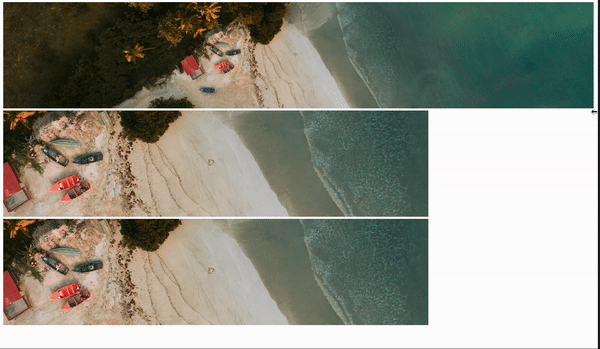@jc-alvaradov/unpic
v0.0.42
Published
React component for responsive, high-performance images.
Downloads
1
Readme
@unpic/react 🖼 📐
React component for responsive, high-performance images.
Features
- Just an
<img>tag! No extra elements, no runtime JavaScript. Easy to style. - Automatically generates correct srcset and sizes attributes for responsive images
- Handles responsive resizing of images, preserving aspect ratio
- Uses native lazy loading and aync decoding for offscreen images
- Handles different image layouts: fixed, constrained and full width
- Uses eager loading and high priority fetching for important images
- Delivers modern image formats, including WebP and AVIF if supported by your browser
- No built step or server-side rendering required: uses your existing image CDN or CMS, with no additional configuration
- Uses unpic to support most image CDNs, including Cloudinary, Imgix, and Shopify
- Can generate a low-res background image for a blurred placeholder effect
Installation and usage
npm install @unpic/reactimport { Image } from "@unpic/react";
function MyComponent() {
return (
<Image
src="https://cdn.shopify.com/static/sample-images/bath_grande_crop_center.jpeg"
layout="constrained"
width={800}
height={600}
alt="A lovely bath"
/>
);
}For the supported props, see the docs.
Unpic for Next.js
If you are using Next.js, you can use the @unpic/react/next component. This
works the same as the main @unpic/react component, but also supports the
Next.js Image Optimizer for images that don't use a supported CDN. This includes
local images, either using a path or an import.
Usage
The component is part of the @unpic/react package, so you install it in the
same way:
npm install @unpic/reactThen, in your Next.js project, import the component from @unpic/react/next:
import { Image } from "@unpic/react/next";
import logo from "../public/logo.png";
// You can use both local images, and ones from image CDNs
<>
<Image src={logo} alt="Logo" layout="constrained" />;
<Image
src="https://cdn.shopify.com/static/sample-images/garnished.jpeg"
layout="constrained"
width={800}
height={600}
alt="Shopify product"
/>
</>;Differences from next/image
The @unpic/react/next component is similar in concept to next/image, and can
use the same image optimizer. However, it has a number of differences that may
mean you prefer to use it instead.
When unpic-img detects that you are using a supported CDN it will load the images from there directly, using the CDN's own image resizing rather than Next.js. This saves the need to process the image twice, and means that you can use the more powerful features of the image CDN.
Unlike next/image, unpic-img will not distort the image to fit the requested
size as it uses object-fit: cover by default, and if using a supported CDN it
will crop the image to the requested aspect ratio.
There is no need to specify a loader, because unpic-img will automatically detect the CDN and use the correct loader, and supports many more than Next.js.
unpic-img includes three built-in layout modes: fixed, constrained, and
fullWidth. These affect how the image resizes, but also allows smarter
generation of the srcset and sizes attributes. See below for an example:

